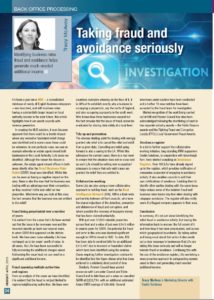 First Published in IRRV Insight April 2019 edition
First Published in IRRV Insight April 2019 edition
It’s been a year since HUB – a consolidated database of nearly all English business ratepayers was launched and with business rates having a substantially larger impact on local authority income in the near future, this article highlights how HUB is assisting Councils with revenue generation.
In creating the HUB solution, it soon became apparent that there could be a drastic impact for Authorities where any revised or backdated relief charge was identified and in some cases these could be extensive. In one particular case we saw an example whereby an Estate Agent closed both businesses in the Local Authority areas we identified. Although the reason for closure is unknown, the estate agent closed offices in both areas shortly after the SBRR fraud was identified. Whilst this can be seen as having a negative impact on the area there is also the view that the business was trading with an advantage over their competitors as they received 100% rate relief on two properties. Whichever way you look at this case, the fact remains that the business was not actually entitled to the relief.
Fraud being perpetuated over a number of years
It is evident from the cases that Local Authorities have worked out that the issue is by no means new and the incorrect awards go back over several years to when small business rate relief first appeared on the statute book. We have seen cases whereby Authorities have recharged up to 10 years worth of rates. In all cases the Authorities have been successful in fully recovering the additional charges raised. Addressing the issue head on can result in a significant additional income to the Authority.
Fraud Spanning Multiple Authorities & Regions
From an analysis of the cases we have identified, it is evident that the fraud is not just limited to regions/neighbouring Authorities. We have seen countless examples whereby on the face of it, it is difficult to establish exactly why a business is occupying a property in, say the North of England and also occupying a property in the South West. Who knows how these businesses expand but the fact remains that the issue of fraud cannot be eradicated by sharing data, solely at a local level.
Tidy up and Prevention
The obvious starting point for dealing with wrongly granted rate relief is to cancel the relief and rebill from a given date. Cancelling any relief going forward is also a saving to the Local Authority. Whilst this addresses the current cases there is a real need to ensure that the situation does not re-occur and as such Authorities should by vetting new occupation/ratepayers to ensure that only valid cases are granted the relief they are entitled to.
Collaborative Working
Some Authorities are also using a more collaborative approach to tackling Fraud such as the Kent Intelligence Network. The Kent Intelligence Network (KIN) is a Kent-wide partnership between local authorities whom have the shared objectives of the detection, prevention and deterrence of fraud and corruption, and where possible the recovery of taxpayers money that has been claimed unlawfully. The KIN consists of the following authorities: Ashford, Canterbury, Dartford, Dover, Folkestone & Hythe, Gravesham, Kent County Council, Kent Fire & Rescue Service, Maidstone, Medway, Sevenoaks, Swale, Thanet, Tonbridge & Malling and Tunbridge Wells.
With just over 57,000 rateable properties across Kent and a value of just over £54.5 million in awards given for Small Business Rates Relief (SBRR), the potential for fraud and error in this area was deemed significant enough for the KIN to invest in HUB. To date, the KIN has been able to send out bills for an additional £313,467 due to incorrect or fraudulent claims which have been identified using the HUB solution. Cases requiring further investigation continue to be identified but this figure shows what has been achieved in a relatively short period of time since HUB was introduced.
Similarly, Preston Council have pooled resources with Lancaster Council and Fylde Council and to date have put a value on cancelled SBRR at £202,734 with an additional estimated future SBRR savings of £88,985. Several interviews under caution have been conducted and a further 16 new matches have been accepted by the Fraud team for investigation.
Market recognition of the work being carried out at KIN and Preston Council has also been acknowledged following the shortlisting of each in two separate industry awards, the Public Finance awards and the Fighting Fraud and Corruption Locally (FFCL) Local Government Fraud Awards.
Avoidance Register
In a bid to further support the collaborative working initiative, Destin Solutions in conjunction with Greenhalgh Kerr have started compiling an Avoidance Register. Over 100 Local Authorities have already signed up to the register which provides notification of companies suspected of engaging in avoidance activity, it also enables Councils to add their own notifications of avoidance. Enabling Councils to identify other parties dealing with the same issue it helps reduce some of the isolation fraud and business rates team may feel when dealing with rate-payer avoidance. The register will also notify users if a flagged company appears in their area.
Conclusion
In summary its not just about identifying the initial fraud or avoidance activity, but tracing the information back to uncover the full extent of it and how long it has been perpetuated and across which geographical boundaries. By taking action and being vocal about that action it is also sending out a clear message to businesses that Authorities are taking this issue seriously and will no longer tolerate fraud or avoidance. Combining this with the use of the avoidance register Authorities are taking a more proactive approach to safeguarding monies owed to them and generating much needed additional income.
